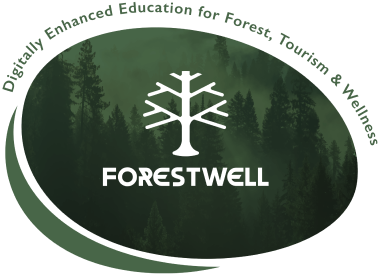Topic Progress..
Overview of Topic 1.2 The Need to Put ForestWell at the Forefront of the Evolutionary Wellbeing Sector delves into the rising significance of ForestWell, a forest-based wellness and tourism initiative, which has surged post-COVID-19 era. It explores the increasing demand for outdoor recreational activities and the subsequent growth in forest-based tourism, driven by urbanisation, increased wealth, and a collective desire for natural retreats. Ths topic highlights the benefits of ForestWell tourism, its alignment with sustainability, and the unique business opportunities it presents for tourism SMEs and how they can join the evolutionary wellness sector.
Since COVID-19 the demand for outdoor recreational activities in nature and forests has surged with projections indicating it may become the largest economic activity in the EU. More people than ever before are participating in outdoor recreation activities and the last number of years have seen a rapid growth of the sector. The health benefits to spending time outdoors are immense and support our social, mental and physical health. As a result, specialised domestic and tourist activities, including forest-based experiences, are gaining popularity. One of the main drivers of growth in interest in outdoor pursuits and nature-based activities has been urbanisation, increased wealth, and more leisure time. People want to simply get away from their busy lives, busy environments and material possessions into clean, peaceful, simple, natural environments.
Liam Twomey, Chair of Comhairle na Tuaithe, Ireland, highlights the importance of the outdoors due to the COVID-19 pandemic. ‘The importance of the outdoors and outdoor recreation amenities has become clearer than ever due to the Covid-19 pandemic over the past few years. It has shown us the wealth of opportunity we have to enjoy, as well as its importance for our physical and mental health. A positive consequence of the pandemic is that more people are now enjoying the outdoors and therefore it is essential that the growth in demand is met with sustainable and responsible development in the outdoor recreation sector’ (Liam Twomey, Chair of Comhairle na Tuaithe, Ireland)
“ForestWell tourism represents a significant shift towards sustainable forest wellness experiences, where the focus is on experiencing the healing power of nature and forests. This trend aligns with the growing demand for wellness tourism and the need for eco-friendly travel options.” (ForestWell Project). The surge is growing for people becoming nature lovers and seeking forests and nature as their ‘safe haven’ or ‘places of serenity’ or ‘happy place’. This is explained if we look at it on a deeper level where people are gravitating to forests as they are seen by most as wonderful, magical, mystical places, where you can unwind and draw mental and emotional strength while get away from stressful and busy lives.
ForestWell presents a remarkable opportunity for tourism, wellbeing and forest related businesses to develop nature-based experiences centered around forests, sustainability, and wellbeing. By tapping into the growing demand for wellness-focused nature travel, SMEs can create unique offerings that position them at the forefront of the evolutionary wellbeing sector, promote health and wellness, stand out in the market and attract environmentally conscious tourists and be sustainable through innovative, forest-based tourism experiences.
ForestWell enables SMEs to develop distinctive nature nature-based tourism experiences centered around forests. By tapping into the growing demand for wellness-focused travel, SMEs can create unique offerings that differentiate them in the market and attract environmentally conscious tourists. ForestWell provides innovative approaches to promoting mental and physical health in the wellbeing sector through forest-based activities like forest bathing and meditation. SMEs in this sector can diversify their services by incorporating these nature-based therapies, catering to individuals seeking holistic wellness experiences.
Rusly Harsono, MD, head of Stanford Lifestyle Medicine, emphasises the benefits of nature-based activities: “Both hiking and forest bathing harness the power of nature to offer a wide range of benefits for our physical and mental wellbeing,” says Rusly Harsono, MD, head of Stanford Lifestyle Medicine Social Engagement and Clinical Assistant Professor at the Stanford School of Medicine. “Hiking provides an outdoor activity that activates our nervous system for greater physical health, whereas forest bathing calms our nervous system and improves our emotional wellbeing, which is equally important to physical health.” (Source Stanford University, Longevity)
As a result ForestWell tourism and businesses are more important than ever to meet this growing demand that is both positive to all and the environment and the planet. As explained, ForestWell’s key target markets are environmentally conscious travelers seeking naturally immersive and authentic experiences that connect them with nature, and tourism businesses e.g., farm stays, eco accommodation, glamping stays, regenerative rural retreats. They are modern consumers, many from urban areas, interested particularly in forest and nature based tourism experiences that offer a retreat from the stresses of daily life, providing opportunities for relaxation, rejuvenation, and mental health benefits through activities like forest bathing, hiking, and meditation. In essence the ForestWell tourist wants experiences that include;
